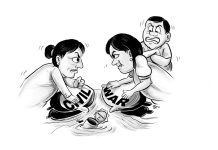
THE SCHOOL-based immunization drive in Western Visayas has exposed a dilemma: how far should parental authority reach when public health is at stake? The Department of Health (DOH) admits that securing consent from parents remains one of the most persistent barriers in vaccinating over 185,000 children across the region. Fear of side effects and a lack of trust in government assurances have left many parents hesitant to sign off on vaccines that are proven, safe, and free.
It is natural for parents to exercise caution. Every mother and father wants to protect their child, and in an age of rapid information — and misinformation — concerns about vaccines have multiplied. But in a society where disease knows no borders, individual decisions inevitably carry communal consequences. One child unvaccinated is not only one child unprotected; it is also one potential carrier in a classroom, a neighborhood, or an entire community.
Western Visayas is already seeing circulation of measles, a highly contagious disease that can sweep through schools with alarming speed. The consequences of an outbreak extend beyond missed classes. Families face the economic burden of hospitalization, and children risk life-threatening complications. It is precisely this danger that immunization programs are designed to prevent.
The irony is that vaccines are among the most rigorously tested and monitored medical interventions available today. As DOH officials rightly remind us, vaccines approved by the Food and Drug Administration and the World Health Organization are both safe and effective. And vaccination is one of the simplest, most effective, and cost-free ways to safeguard the future. Yet these assurances, grounded in science, continue to be drowned out by fear, rumor, and social media distortions.
The challenge, therefore, is not only medical but social. It demands a recalibration of trust between government, schools, and families. Parents must confront difficult questions. At what point does caution transform into neglect? When does the insistence on absolute parental control compromise not only one’s own child but an entire community of children?
Parental rights are sacred, but so too is the right of every child to grow up safe from preventable disease. In moments of crisis, hesitation becomes a luxury we cannot afford.
The Western Visayas experience offers a sobering reminder: natural disasters like typhoons can interrupt immunization campaigns, but man-made obstacles — fear, misinformation, and indecision — may prove far more damaging.
The question is not whether parents should care. They already do. The real question is whether that care can rise above fear to embrace responsibility.







